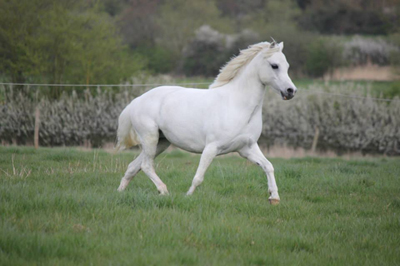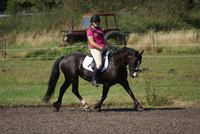Posted by EquiFeast on 9th Jun 2017
What does Spring and Summer mean for laminitis sufferers?
So the warm weather is threatening. The grass is going mad and everyone with a laminitic prone horse or pony is rather concerned!

Hopefully you have managed to get some weight off your horse over winter. If you haven’t, it is going to be really hard to stop it piling on over summer because horses are programmed to do exactly that.
Laminitis is an insulin resistance disease – meaning it is much like diabetes in humans. So the problem nutrients are sugars and starches – exactly the things your grass will be producing at this time of year. The shorter and fresher the grass, the higher the level of sugars it will contain.
The type of grass is also an issue; if your horses are on rich, ryegrass and clover ex-dairy pasture then the sugar levels will be high. Cut down the time spent grazing and use a grazing muzzle - because some ponies can really stuff a lot of feed in despite being restricted to a very few hours turnout!
So long as your pony doesn’t have laminitic symptoms, remember that the best way to control weight and insulin resistance is exercise. So get riding, lunging and whatever else you can do to burn off those excess calories naturally.
 Feed high fibre hay and if your hay
is also from rich pasture, you really need to soak it to get the sugars out. This will have another benefit, which is to also remove a lot of the excess
potassium in spring grass.
Feed high fibre hay and if your hay
is also from rich pasture, you really need to soak it to get the sugars out. This will have another benefit, which is to also remove a lot of the excess
potassium in spring grass.
Of course all this effort to remove sugars, and potassium will also leach out a whole pile of other water soluble vitamins and minerals. That is not smart! So consider a broad spectrum supplement or balancer. Better still, pick one with some ingredients specifically selected to help with insulin management; probably the most important are chelated calcium and psyllium.
Many of you will know that we believe that far too much magnesium is fed to our modern horses, but this is one time of year when magnesium may need a little extra supplementation. All that urine being produced to excrete excess potassium will also flush magnesium out (because horses cannot control magnesium as well as they can other electrolytes). So consider adding SMALL (perhaps we should say TINY) amounts of magnesium during the spring flush. But stop again when summer grass dries off, otherwise the magnesium itself may make your horse less confident and it can interfere with the control of hormones, like insulin and leptin.
So spring and summer is a good time to remind ourselves that in all things
nutritional, just because a little of something is good (even vital), that
doesn’t mean that more is good or better. In fact both humans and horses
probably suffer far more malnutrition from overfeeding things than from
underfeeding!
Want more advice?
Contact a member of the team on 01453 836976
advice@equifeast.com
Photos by: Rebecca Child Photography & EquiFeast
